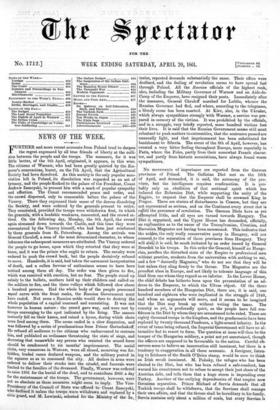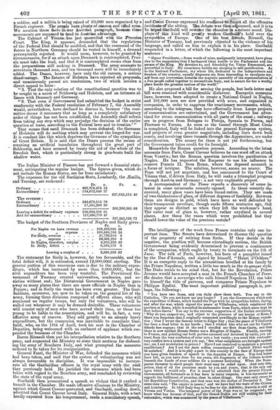No movements of importance are reported from the German provinces
of Poland. The Gallician Diet met on the 16th of April, and demanded, it is said, the autonomy of the pro-, vince, but the intelligence requires confirmation. It is pro: bably only an ebullition of that sectional spirit which has induced the Bohemian Diet, while supporting the unity of the Eaipire, to request that the Emperor shall be crowned King in Prague. There are stories of disturbances in Cracow, but they are not represented as serious, and on the Continent every street riot is called the precursor of revolution. The German Diets have as yet attempted little, and all eyes are turned towards Hungary. The Diet is organized, and the Upper House has demanded, officially, an explanation as to the cause of the Transylvanian, Croatian, and Slavonian Magnates not having been summoned. This indicates that the nohles, the only really conservative party in Hungary, will not consent. to the separation of these provinces from Hungary. They will alsQ‘it is said, be much irritated by an order issued by General Benedek to his troops. In this order the General, himself an Hunga- rian, ascribes the disturbed state of the Empire to professional men without practice, students from the universities with nothing to eat, and a few " dastardly Magnates," who do not see that they will be lost unless they cling firmly to the throne. The Magnates are the proudest class in Europe, and not likely to tolerate language of this kind from one whom they regard as an inferior. In the Lower Houses the chief debate has hitherto been upon the presentatioi of an ad- dress to the Emperor, to which the Ultras object. Of the three hundred members of the Hungarian Diet, there are, it is said, one hundred and eighteen who were implicated in the struggle of 1848, and whom no arguments will move, and it seems to be imagined that the Diet may break up without voting the taxes. The country as yet, is profoundly quiet, as the people have full cons fidence in the Diet by whom they are accustomed to be ruled. There are eighty thousand troops in the kingdom, and the gendarmerie have been replaced by twenty thousand Pandours, a light-armed infantry. In the event of taxes being refused, the Imperial Government will have no al-. ternative but to resort to force. The question at issue will then be the temper of the Hungarian soldiery, a point not yet ascertained, though the officers are supposed to be favourable to the nation. Careful ob- servers seem to believe an insurrection still imminent, but there is a tendency to exaggeration in all these accounts. A foreigner, listen- ing to Irishmen of the Smith O'Brien stamp, would be sure to think an Irish revolt imminent. M. Pulssky, the refugee who has been elected to the Diet, but who has been refused a safe-conduct, has warned his countrymen not to refuse to accept their just share of the Austrian debt, and tells them that a huge storm is impending over Turkey. Another of the outlying dependencies of that empire now threatens separation. Prince Michael of Servia demands that all Turkish troops shall be withdrawn, that the Servians shall manage their own affairs, and that the throne shall be hereditary in his family. Servia contains only about a million of souls, but every Servian fs
a soldier, and a militia is being raised of 50,000 men organized by a French engineer. The people have pleirty.of cauncuivand rifled arms. We mention these facts in our Austrian paragraph, beoause these movements are supposed to tend to Austrian advantage.
The Cabinet of Vienna. has just quarrelled with the Prussian. Court. The King, it appears, demanded that the regulations of the Federal Diet should be modified, and that the command of the forces in Northern Germany should be vested in himself, a demand peremptorily rejected. It would seem, however, to be granted by circumstances, for if an attack upon Denmark is contemplated, Prus- sia must take the lead, and that it is contemplated seems clear from the preparations still making in Denmark. The army amotusta.to seventeen thousand men, and ten thousand more will be immediately added. The Danes, however, have only the old cannon, a serious disadvantage. The Estates of Holstein have rejected all proposals,, and unanimously passed six. resolutions, two of which involve a direct appeal to f.orce
" 3. That the only solution of the constitutional question was to be sought in a union of Schleswig and Holstein, and an intimate al- liance with Denmark and Germany. " 6. That even if Government had submitted the budget in strict Conformity with the Federal resolution of February 7, the Assembly would, nevertheless, have declined to discuss it, because 'the com- mittee deems it necessary that as long as a completely satisfactory order of things has not been established, the Assembly shall refrain from taking any step which may prejudge the decision of the entire question at issue, according to the Federal laws and to treaties.' That means that until Denmark has been defeated, the Germans of Holstein will do nothing which may prevent the longed-for war. It is conduct like this which.deprives the Germans of the sympathies of Great Britain. It is said that the Danes possess the means of creatimg an artificial inundation throughout the great part of Schleswig, and have secured by treaty the aid of the whole of the Swedish fleet, which is particularly strong in gun-boats built for shallow water.































 Previous page
Previous page